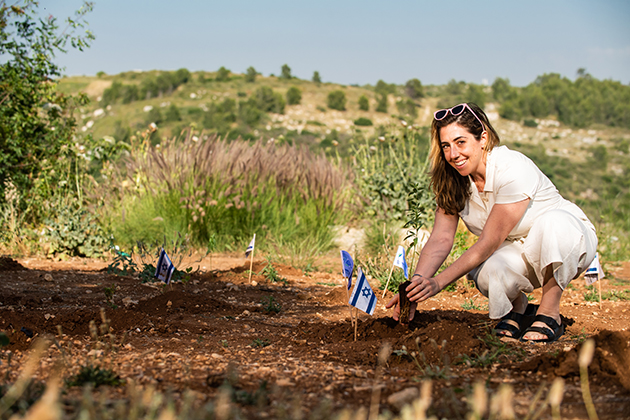Planting trees in Israel is a cherished tradition deep-rooted in Jewish history and culture. This act symbolizes growth, renewal, and the enduring connection between people and the land of Israel. Today, the Jewish National Fund-USA (JNF-USA) continues this legacy, offering various ways to plant trees and commemorate special occasions through tree certificates. With the introduction of e-Tree certificates, planting trees in Israel is now easier than ever.
Meaningful Reasons and Occasions to Plant Trees in Israel
Discover some meaningful reasons and occasions to plant trees in Israel, enhancing your connection to the land and strengthening the bond with your loved ones.
A Gift for Yourself
Planting a tree in Israel is a unique and rewarding gift for yourself. It’s a way to invest in the environment and contribute to the greening of the desert, transforming arid landscapes into lush, vibrant oases. By planting a tree, you are also part of a legacy that has planted over 260 million trees since JNF-USA's founding in 1901. This self-gifting reminds you of your commitment to environmental stewardship and your personal connection to the land of Israel.
For the Important People in Your Life
Recognizing the special people in your life with a tree certificate is a heartfelt gesture that goes beyond a typical gift. Whether for a birthday, anniversary, or any significant milestone, planting a tree in someone’s honor is a lasting tribute that reflects their importance to you. JNF-USA's tree certificates can be personalized with a message, making it a thoughtful and memorable gift that celebrates your loved ones while supporting Israel’s ecological future.
Plant a Tree in Israel in Memory of Someone
Planting a tree in memory of someone who has passed away is a meaningful way to honor their life and legacy. It is a tribute that lives on, symbolizing eternal life and the ongoing impact of their memory. JNF-USA offers beautifully designed tree certificates that can be personalized to commemorate the life of a loved one. This act of remembrance helps create a living memorial in Israel, fostering a sense of continuity and peace.
For a Health Care Provider or Someone Special
Expressing gratitude to those who have made a difference in your life is important. Planting a tree in honor of a healthcare provider or someone who has done something special for you is a unique way to show appreciation. A tree certificate from JNF-USA can be customized to reflect your gratitude, providing a lasting tribute to their kindness and impact. This gesture not only honors them but also contributes to Israel's ecological well-being.
Celebrate Earth Day by Planting a JNF Tree
Celebrating Earth Day or any environmental milestone by planting a tree in Israel underscores your commitment to protecting and preserving our planet. JNF-USA’s tree-planting initiatives help combat desertification, promote soil conservation, and support Israel’s agricultural infrastructure. By planting trees, you actively participate in the global effort to create a greener, more sustainable world. It’s a celebration of the earth with a tangible, positive impact.
Celebrate a Pet
Pets hold a special place in our hearts, and planting a tree in their honor is a unique way to celebrate their companionship. Whether in celebration of their life or as a memorial, a tree certificate dedicated to a beloved pet symbolizes the joy and love they brought into your life. JNF-USA’s e-certificates allow you to personalize this tribute, creating a lasting legacy in Israel that honors your furry friend.
The Convenience of e-Tree Certificates
JNF-USA's introduction of e-Tree certificates makes planting trees in Israel more effortless and accessible. With the click of a button, you can instantly purchase and send a tree certificate, perfect for last-minute gifts or when you need to recognize someone quickly. These certificates can be customized with various beautiful designs and personalized messages, ensuring your gesture is meaningful and timely.
Tree E-Certificates Through the Jewish National Fund-USA
Support Israel’s Green Future with JNF
When you plant a tree in Israel through JNF-USA, you support various ecological and environmental initiatives transforming Israel’s landscape. From firefighting and fire prevention to soil conservation and agricultural development, your contribution helps maintain a vibrant and sustainable environment for future generations. JNF-USA’s efforts have created over 250,000 acres of forests, providing a green canopy for people and wildlife alike.
Join a Legacy of Growth and Renewal with JNF-USA
Planting trees in Israel is more than a symbolic act; it’s a tangible way to contribute to the country’s ecological health and future. Whether honoring a loved one, celebrating a special occasion, or simply showing appreciation, planting a tree through JNF-USA connects you to a century-old tradition of growth, renewal, and commitment to the land.
Jewish National Fund Trees: Plant Trees in Israel Today
- Trees for Israel -Paper Certificate
- Memorial Tree in Israel
- Plant a Tree for Bat and Bar Mitzvah’s
- Tree Certificates for Your Pet
- Wedding Gift Tree Certificates
- All JNF Trees
About JNF-USA
Jewish National Fund-USA (JNF-USA) is a cornerstone of Israel’s development efforts, committed to creating a better future for the nation. Through comprehensive initiatives in environmental sustainability, community development, and education, JNF_USA has significantly contributed to the modernization and growth of Israel. By opting to donate to Israel via Jewish National Fund-USA, you support essential projects that drive progress and uplift communities across the country.


